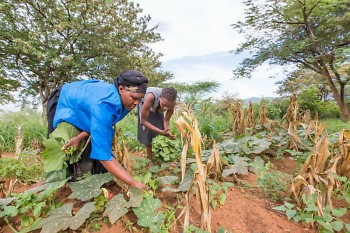That quote is from a new video and study guide on climate change that has broad application in faith circles—and not one that Americans expect from mainstream Protestants. The resource was launched yesterday, April 6, 2015, on the Climate Conversation website.
"Climate Conversation: Kenya" is a new resource from Grand-Rapids based World Renew and the Christian Reformed Office of Social Justice. The series of four short videos and companion discussion guide combines on-the-ground footage and interviews from Kenya with study materials to help faith-based groups and individuals get past climate politics and ideology.
“'Climate Conversation: Kenya' gets up close and personal with flesh-and-blood people who are deeply and intensely affected by the changing climate,” says Kyle Meyaard-Schaap, a project’s organizer. “It’s a chance to meet people, not statistics; to hear stories, not arguments. It’s an invitation to a conversation.”
“This visual is what we’re looking for, and we’re excited to use it immediately,” says Ben Lowe, national organizer for Young Evangelicals for Climate Action, a movement of under-age-30 Christians who are coming together and living out their faith by responding to the climate crisis.
“'Climate Conversation: Kenya' is exactly the kind of resource we evangelicals need. It transcends our polarized political climate in the United States to show how climate change is impacting our brothers and sisters in places like Kenya,” Lowe says. “It creates space for much-needed conversations around what's happening around the world and how we can respond more faithfully as part of the body of Christ.”
America’s political debate about global warming is a familiar one—and contentious in religious circles. While the subtle effects of global warming may not be evident to North Americans, they are clear in many places around the globe, including Kenya. Those who live in extreme poverty depend most directly on a healthy earth for sustenance. Subsistence farmers around the world can testify that global warming is a serious threat.
This resource states that the Christian church is obligated to ensure that current and future generations don’t experience greater suffering because of our actions and, perhaps more importantly, our inaction.
“As Christians, we are called to love our neighbors. Taking care of the environment is a way to do that—not just across the street but around the world,” says World Renew church mobilizer Kris Van Engen.
“For millions of subsistence farmers in Kenya, climate change is a reality in which adaptation can literally mean the difference between life and death. When global neighbors say that their farms are now disrupted by climate change, that their long-settled lands are now regularly being eroded by flooding, that droughts are leading to water shortages and tense tribal relationships; we have a moral responsibility to listen and respond.”
In 2012, the Christian Reformed denomination affirmed the urgency of climate change and called Christian churches and members to action as a religious, moral and ethical responsibility.
The Rapidian, a program of the 501(c)3 nonprofit Community Media Center, relies on the community’s support to help cover the cost of training reporters and publishing content.
We need your help.
If each of our readers and content creators who values this community platform help support its creation and maintenance, The Rapidian can continue to educate and facilitate a conversation around issues for years to come.
Please support The Rapidian and make a contribution today.
